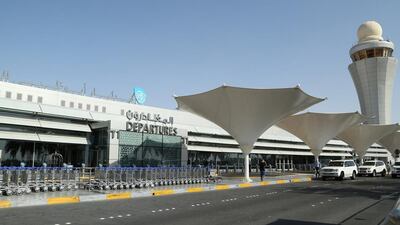* With additional reporting from LeAnne Graves and Joyce Karam in Washington
A ban on passengers carrying laptops and other devices on flights to the United States has been lifted after enhanced security measures were brought in at Abu Dhabi International Airport.
The hub is the first airport in the world to have been given the green light by the Department of Homeland Security’s Transportation Security Administration since broader security requirements were unveiled last Wednesday by the US. It requires enhanced screening of passengers and devices at 280 airports globally, impacting 180 airlines.
Etihad Airways chief executive Peter Baumgartner said the move would be a confidence boost for passengers, the airline, the airport and Abu Dhabi as a whole.
“This sends a really strong message about the reputation of Abu Dhabi, that it has one of the safest airports which complies with the most stringent security measures,” he said.
In March, the United States first announced that laptops, tablets, e-readers and other large electronic devices would be banned from cabins on flights from 10 airports, including those in Abu Dhabi and Dubai. This caused inconvenience to passengers flying through the UAE who were forced to check-in devices with hold baggage.
The decision was taken based on what the US said was "evaluated intelligence" of "innovative methods" being used by terrorists but did not mention any specific threat to aviation.
On Sunday morning, the TSA completed its “observation and verification session” and EY171 to Los Angeles was the first flight to depart Abu Dhabi International with devices cleared to be on board, Etihad said.
A US official at the Department of Homeland Security confirmed to The National that Eithad Airways flights from Abu Dhabi are now cleared for laptops and other electronic devices to be carried on board, hailing Etihad's efforts as “a model” for other airlines working to comply with the enhanced security measures.
The approval, the US official added, was "verified with visual confirmation by TSA officials ensuring the measures have been implemented correctly and to the full extent required”. The initial visit by TSA officials will be followed up by “regular scheduled visits."
The purpose-built border pre-clearance facility at Abu Dhabi International, which allows passengers to save time by going through US immigration, customs and agriculture inspections before they depart, played its part in allowing for a close and proactive dialogue with the TSA and Homeland Security over the past month, said Mr Baumgartner.
As a result, even though the full details of the new measures were only revealed last week, Abu Dhabi was able to put in place the appropriate systems, processes and specialised security equipment. Extra staff and specialised training have also been required. A number of parties involved, internal and external, worked together on a what was a massive task, Mr Baumgartner said. This ensured that the airport and the airline was compliant as quickly as possible once the full details of the new measures were announced.
Yousef Al Otaiba, the UAE ambassador to the US, was also instrumental in ensuring that Abu Dhabi had the “open ear” of US authorities, Mr Baumgartner said. The close cooperation on the airport’s and airline’s compliance with the enhanced security requirements is testament of both the ambassador’s and the UAE’s standing in Washington.
Mr Al Otaiba said: "The UAE is a leading hub of global aviation and we need to work closely with our international partners to continually enhance intelligence and security measures to protect the travelling public. Specifically, we appreciate the close cooperation with the US Government / Department of Homeland Security to address new threats and to protect global aviation. "The new measures also will help to increase travel flows to the US which is great for the US and the UAE economies."
The laptop ban had resulted in a drop in demand on flights to America operated by UAE carriers. Emirates has temporarily cut back on capacity into the US, deploying aircraft on to other routes, particularly in Asia.
The lifting of the laptop ban for flights from Abu Dhabi should be a boost for passenger demand for Etihad, according to Mr Baumgartner.
“This will give us a great competitive edge,” said Mr Baumgartner. “The more competitive we are, the more healthy our growth rates will be.”
The airline operates 45 flights a week from Abu Dhabi to six US destinations.
Etihad had, however, been somewhat protected from the worst impact of the laptop ban because of the pre-clearance facility.
In the first four months of this year, Etihad flew 203,515 passengers to the United States, a rise of 13,157 compared to a year earlier. Traffic from the Indian subcontinent was most affected, however, with Etihad losing some market share as passengers opted to fly through Europe to avoid the laptop ban.
Last month, Etihad began operating the A380 on its second daily flight to New York’s JFK airport. However, Mr Baumgartner said that there are no immediate plans to add further capacity into the United States.
“We are happy at the moment [with where capacity is]. We have a good foundation for future growth,” he said.
Saj Ahmad, chief analyst for StrategicAero Research, said that being the first to have the laptop ban lifted will be a real opportunity for Etihad.
It may now win market share from other carriers, particularly given the pre-clearance facility at Abu Dhabi International, Mr Ahmad said.
Will Horton, a senior analyst at Capa – Centre for Aviation said that Emirates and other carriers would be working quickly to have the ban lifted too.
However, the bigger impact of the ban has been on passenger confidence hit by unclear and expanding regulations.
“Flying needs to be made easier, not more difficult and nuanced,” said Mr Horton.


